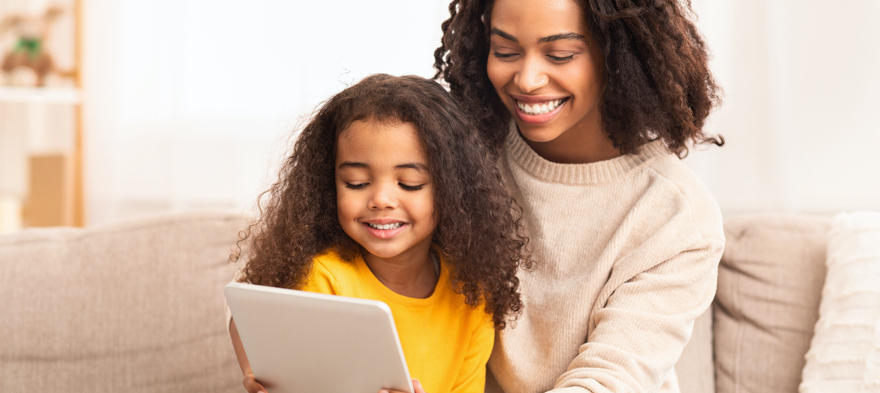
OK, I have a confession to make. I have not been as good at monitoring my children’s internet access as I should have been. If I had to grade myself, I would be C+. And that would have been enough pre-Coronavirus, but that C+ is now an F.
As someone slightly obsessed with getting grades, you may be wondering (judging) why I didn’t do a better job of protecting my children in the digital world. Thanks, “Karen,” for questioning my parenting. But the truth is, my husband and I spend an inordinate amount of time and energy making sure our children are physically safe. Rarely, actually never, are my children ever allowed to be alone.
So, when it comes to controlling who and what our children physically access, we get an A+. But [pullquote]with the mandate to stay—and learn—at home, our parenting priorities have to change.[/pullquote] Yes, it is important that we physically protect them, but that's much easier when they are physically in the house with us. But now the whole World Wide Web is available to them and, as a result, we have little control over who they interact with.
Now that their entire world is online, parents must e-learn how to make the internet safe for our children. And with the sudden opening of the whole wide world of the internet comes all of the ugliness from which we try so hard to protect our children.
My husband and I put in a lot of time, effort and planning into creating the type of environment that would be conducive to raising Black girls with healthy self-esteem. We moved to our neighborhood specifically because of the racial, economic and social composition. We chose schools for our children with a mind to their academic success (we eliminated schools with racial achievement gaps), as well as schools that could protect our children from racism, both personally and institutionally.
We are also overly involved in “choosing and sorting” who our children’s friends are. Granted, they are still in elementary school, so we have more control than parents of high school students, but we are very careful—maybe a little too careful—to monitor who our children are around. We hope to make sure they are friends with people who have the same values and rules as our family.
Coronavirus quickly burst our “we are good parents who monitor our children” bubble. A few days ago, our daughters raced into our room holding their phones. While they were playing Roblox, someone had commented that they should “go back to Africa” and that Blacks are “human machines.” My academically brilliant children were confused. They knew by the tone that those comments were supposed to be insulting, but they didn’t understand why “go back to Africa” would be used negatively.
My husband and I stopped and looked at each other, dismayed. We glanced at their phones and realized that there were all kinds of terrible, hateful comments made by some of the participants. Words like “nigger,” “bitch” and even “ugly, watermelon, monkey people,” were in the comments. My children didn’t fully understand what all that meant, but they knew it was said with the intention to be hurtful.
And just like that, all our planning, careful protection and intentional management of our children’s “social and physical” access was gone. All the work we did to protect them from racism (and other social ills) was erased because [pullquote position="right"]the internet has now expanded our children’s social circle far beyond what we could control.[/pullquote]
In some ways, I know we are still very lucky. While we are all sheltering in place, the chances of them being abducted from our house have significantly dropped. Our children are physically safe at home. But, socially, they are unsafe. And even more so now, with all of the people getting onto the internet. It has, in fact, undone all of the cautions and the “safe from racism” world that my husband and I worked so hard to create.
So we are scrambling to figure out once again how we protect our children online from racism, sexism and hate when the world is more open and they need to have access to the internet to learn.
We have decided on a couple of strategies that I will share.
We are still “e-learning” how to protect our children, and we are going to implement the three new house policies, but that might not be enough. Internet hackers are breaking into Zoom classrooms and for every website with open social borders that we know of, there are probably 10 more we don’t.
Most depressingly, we have to figure out how to have the “race talk” with our children. Honestly, I am emotionally devastated and unable to even start that conversation. Coronavirus has changed the world for all of us, especially our children. And as parents, we have an obligation to try our best to make sure that our children are as safe online as they are protected at home.
ShaRhonda Knott-Dawson is the mother of two free-spirited, strong-willed girls and has a husband who should be appointed a saint for co-existing in the madness that is their life. She writes on politics, education, current events and social justice. She is also a taco enthusiast, a proud member of the Bey-hive, and truly believes that she will be receiving her letter from Hogwarts any day now.
The fight for educational equity has never been just about schools. The real North Star for this work is providing opportunities for each child to thrive into adulthood. This means that our advocacy...
Your donation will support the work we do at brightbeam to shine a light on the voices who challenge decision makers to provide the learning opportunities all children need to thrive.
Ed Post is the flagship website platform of brightbeam, a 501(c3) network of education activists and influencers demanding a better education and a brighter future for every child.
© 2020–2024 brightbeam. All rights reserved.